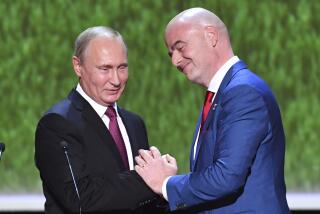World Cup: Migrant workers got World Cup started and have kept it going
Reporting from ST. PETERSBURG, Russia — Invisible to the crowds flocking to World Cup venues all over Russia are legions of migrant workers from Central Asia, who built the stadiums and keep them running, staff concession stands, and clean up after fans who revel through city streets.
They are among millions of migrants who perform menial jobs across Russia, and face routine police harassment and ethnic profiling. Yet they are a pillar of the economy and aid Russian leader Vladimir Putin’s geopolitical strategy — and without them, Russia might not have managed to host a World Cup at all.
“Migrants made up the main workforce” in the construction of stadiums and transport infrastructure for the tournament, Valery Solovei, a professor at Moscow’s MGIMO foreign policy institute and an expert on immigration and nationalism, told the Associated Press. “Without migrant workers, Russia couldn’t have built all these things so quickly.”
Bobur Ulashov, 37, is one of them. He left his village in southern Uzbekistan five years ago in search of a job and now works 12-hour shifts sweeping rubbish into his dented metal dustpan at Moscow’s official World Cup fan zone.
“This country took us in, and gives us work,” he said.
Building Workers International says 21 people died on World Cup construction sites. Human Rights Watch documented hundreds of complaints from World Cup workers, finding that many had no written contract of any kind, and some were working in temperatures of minus 13 degrees Fahrenheit with one indoor break in a nine-hour shift.
Migrants staffing Luzhniki Stadium, Moscow’s primary venue where Wednesday’s semifinal and Sunday’s final will be played, insist their conditions and pay are good – about $470 a month during the tournament, with one or two days off per week. But most didn’t want their full names published for fear their employers would punish them.
Gafirjon Kurbonov isn’t afraid to talk. He helped lay asphalt in St. Petersburg as Russian cities cleaned up ahead of the World Cup, and now works as a registered taxi driver in Moscow. His wife and two small children have joined him, and he wants to settle here.
“Business is good. There are so many foreign [fans],” he said in rapid-fire, Tajik-accented Russian. And after the World Cup is over? “There will always be work.”
On the road again
After returning from their Friday quarterfinals in Nizhny Novgorod and Kazan, respectively, France and Belgium worked out at their Moscow-area training bases Sunday before traveling to St. Petersburg for Tuesday’s semifinal, meaning they spent four days in three different cities between games.
Russia is a big country – the biggest on the planet, in fact -- so by the time the teams get back to Moscow again, France will have racked up 1,300 miles and Belgium will have gone 1,700 miles since Friday.
Croatia and England will have to travel slightly farther ahead of their semifinal in Moscow. Croatia, which trains in the Leningrad region, near Russia’s borders with Estonia and Finland, traveled to Sochi for its quarterfinal and will cover 2,700 miles between that game and the England match. England, meanwhile, played its quarterfinal in Samara, about an 1,800-mile round trip from its temporary home in St. Petersburg.
U.S. referee still in Russia
MLS official Mark Geiger is among 12 men still in contention to handle the World Cup final after FIFA announced its list of referees, assistants and video assistant referees (VARs) who have been retained for four games in the final week of the tournament.
Geiger, who officiated three games in Brazil, and David Socha, who called one game in both the 1982 and 1986 World Cups, are the only U.S. officials to participate in multiple World Cups. But Geiger has worked knockout-round games in both of his tournaments.
FIFA has appointed Andres Cunha of Uruguay to handle the first semifinal between France and Belgium on Tuesday in St. Petersburg.
The Associated Press contributed to this story.
[email protected] | Twitter: @kbaxter11







